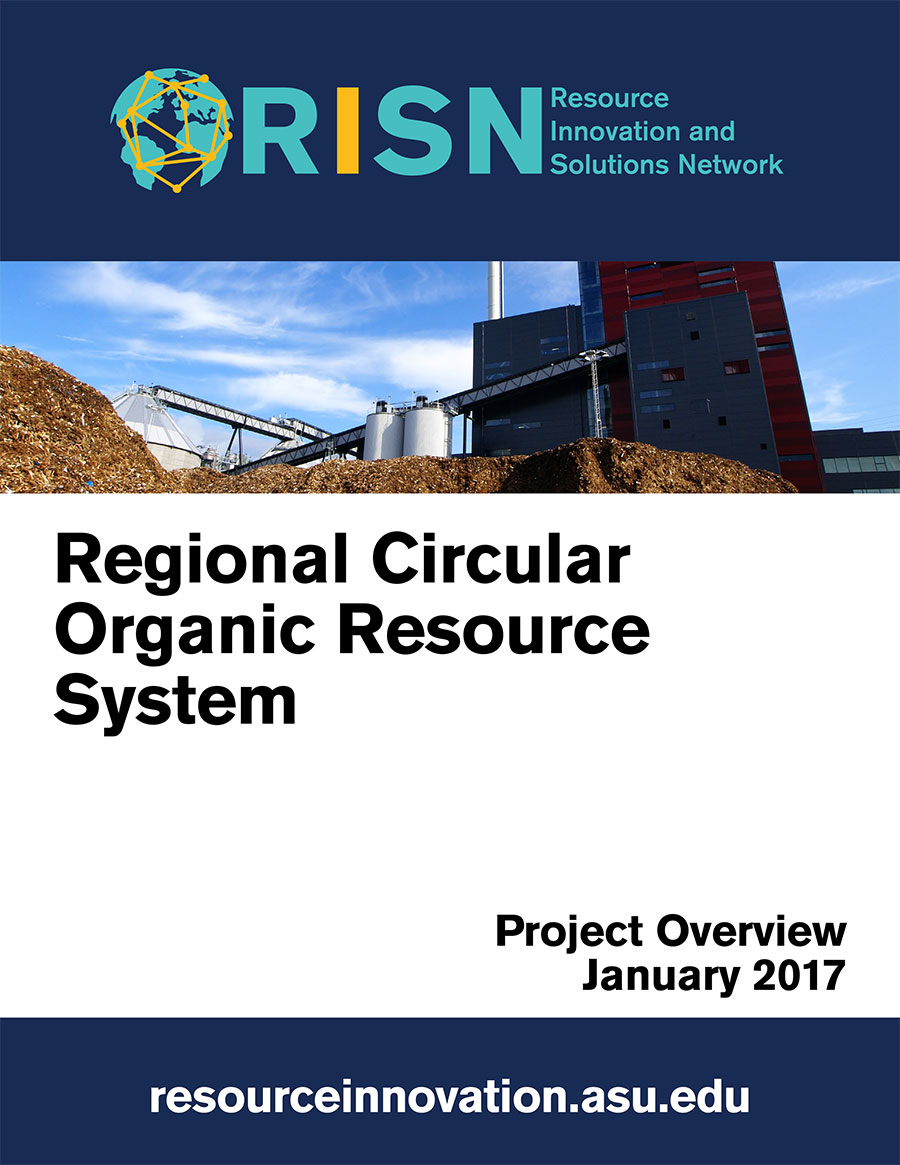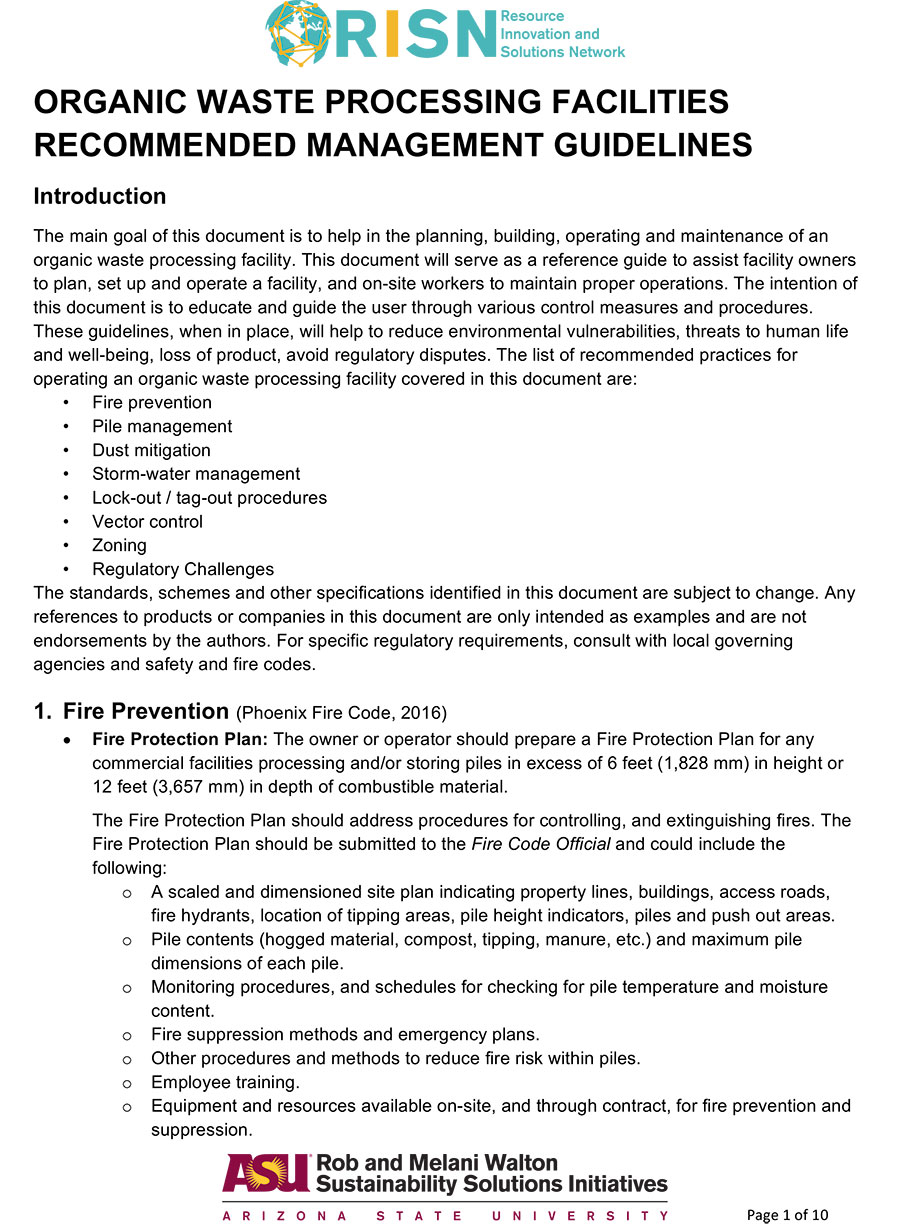Projects
Economic Impact of Circular Economy Opportunities in Phoenix
Arizona State University conducted a two-part study on the potential economic impact of the implementation of a Circular Economy in the greater Phoenix metropolitan region. This study was prepared by the L. William Seidman Research Institute on behalf of the Rob and Melani Walton Sustainability Solutions Initiatives. Learn more.
Regional Circular Organic Resource System
Organic waste represents thirty to sixty percent of the residential waste stream in the Phoenix Metropolitan Area (PMA). In many communities, the majority of this material ends up in the landfill where organics represent both an opportunity cost as a potential market revenue to the municipalities, and as a major contributor to landfill-generated methane emissions.
RISN, in collaboration with six municipalities, two counties and a Native American tribe all located within the PMA, developed the Regional Circular Organic Resource System, a program to assess the feasibility of a regional approach to building an organics management system and to identify plausible pathways to implementing a regional, multi-site organics processing system that diverts organic waste in the PMA from landfills.
This program produced a report that identified plausible pathways to achieving an envisioned 2050 scenario of a regional, multi-site organics processing system that diverts organic waste in the PMA from landfilling. This three-phase scenario in which 11 organic waste processing facility sites could be implemented by 2050 with a total annual organic diversion across the three phases of 400,000 tons resulting in the diversion of 56% of green organics for the participating municipalities.
If you would like access to the comprehensive report or information on joining this regional collaborative or establishing a collaborative in your region, please contact:
Sr. Project Manager, Rob and Melani Walton Sustainability Solutions Service
williamfcampbell@asu.edu
480-727-2547
Waste Assessment Tool
The City of Phoenix, the ASU Walton Sustainability Solutions Services and Generated Material Recovery (GMR) are collaborating to develop a Resource Value Assessment (RVA) Tool. The RVA tool will be an open source tool that can be used by the Solutions Services, ASU more generally, GMR, and other waste stream management and consulting companies to advise industrial clients on how to manage their waste and by product streams in the most profitable and sustainable manner.
PVUSD – Solutions Oriented Waste Reduction
The City of Phoenix, the ASU Walton Sustainability Solutions Services and Mayo Clinic are collaborating with Paradise Valley Unified School District (PVUSD) to develop optimal recycling and waste reduction policies and to implement feasible classroom-based user engagement practices. The basis of this project is a student led research effort and teacher workshops conducted by ASU Sustainability Science for Sustainable Schools. The research project, on which the students are being are mentored by ASU grad students, will quantify recycling and waste reduction practices in PVUSD schools. The results will be used as a basis for recommendations made to the PVUSD school board.
In addition, Solutions Services and ASU’s Sustainability Science for Sustainable Schools will hold up to three teacher professional development workshops designed around sustainability science concepts related to the waste system. The workshops will encourage teachers to develop their own solutions-oriented, project-based activities to reduce waste at K-12 schools in PVUSD consistent with current academic standards. The design of the workshops will guide the development of the project-based activities to support the results of the supplemental research.
Regional GHG Emissions Measurement Phase 1
Develop a state-of-the-art comprehensive regional GHG emissions management system (EMS) that will set the gold standard for how cities address urban climate protection, public engagement and collaborative sustainability-driven economic development in the 21st century. This GHG EMS will place the Phoenix metropolitan area on the forefront of what is quickly becoming the dominant theme within urban sustainability and growth. This project will quantify GHG emissions throughout the Phoenix metropolitan area via multiple accounting perspectives and for multiple space/time domains. This will offer the maximum amount of information and flexibility in understanding GHG emissions.
Living Building Challenge Course and Analysis
The premise of the Living Building Challenge is to imagine a building designed and constructed to function as elegantly and efficiently as a flower. The Challenge is comprised of seven performance areas, or ‘Petals’: Place, Water, Energy, Health & Happiness, Materials, Equity and Beauty. A building that achieves all petals is one that harvests all its own energy and water on site, is built on a restored brownfield site, is built using no toxic materials, recycles its own waste, promotes social equity and has characteristics that are purely for human enjoyment. (http://living-future.org/lbc). The goal of this project to explore the opportunities to incorporate Living Building concepts into the master plan for the RISN campus as well as the envisioned headquarters building. The main vehicle of exploration will be two consecutive graduate level classes offered in the ASU School of Sustainability and co-instructed with Mick Dalrymple and Dr Oswald Chong.
The class is designed to attract and build an integrated team of students from as many of the following disciplines as possible: sustainability, urban planning, architecture, interior design, landscape design, mechanical engineering, construction management, electrical engineering, art, behavioral psychology, social work, and civil engineering.
Multi-family Recycling
In partnership with the ASU Walton Sustainability Solutions Services, Republic Services and the City of Phoenix Public Works Department, this project will consist of two phases. The first phase will involve site assessments, onsite interviews, and the delivery of a baseline recycling infrastructure and communication package. The second phase of the project will be the development of a customized program for each site. Customized programs will not be developed until all of the site assessments and interviews are complete. It is assumed that the baseline package delivered to each site will encourage the adoption of recycling, but will not in and of itself be sufficient to overcome all significant barriers to achieve robust program success. Careful attention will be paid to collection efficiencies, route development and route consolidation. To go further and move beyond standard practice, GS3 will draw upon examples that have proven successful from other urban-based recycling programs. Such examples can be stand-alone programs or operate in combination with each other.
Food Resource Feasibility
In partnership with local grocers and the City of Phoenix, this project will assess the economic viability of pre-consumer food waste solutions and to quantify the amount, quality, and location of food-waste feedstock in the Phoenix metropolitan region. The goal of the project develop technical solution scenarios to assess the pros and cons of known resource recovery technical solutions. These technical scenarios will be augmented with policy recommendations to facilitate the implementation of recommended solutions. The research will identify factors related to energy conversion and will provide insight primarily into economic viability, approaches taken and tools used. It will also include an assessment of best practices in food resource management and an analysis of reverse logistics for backhauling to grocery distribution centers.
City of Phoenix call for partners
The city of Phoenix, through its Reimagine Phoenix initiative, is regularly seeking partners to achieve the city’s goal of diverting 40 percent of waste from the city’s landfill by 2020. Interested parties will be able to submit proposals through a Call for Innovators and Request for Proposals. To be notified when the CFI and RFP will be issued next, please email ReimaginePhoenix@phoenix.gov.
RISN invites organizations to propose projects to be developed through the network. These projects can:
Create new programs and technologies
Convert waste-to-energy, waste-to-oil and waste-to-soil through aversion, diversion and conversion
Be developed on an innovation incubation campus in Phoenix with direct access to feed stocks from municipal and commercial waste streams
To become a partner or a global hub, contact Bill Campbell at williamfcampbell@asu.edu
For information about the Resource Innovation Campus, contact Ginger Spencer at ginger.spencer@phoenix.gov





